A major interchange on the fast rail routes connecting England, Belgium and the Netherlands with France, Lille is the sort of place you remember primarily for passing through. Many a Belgian-bound British beer enthusiast will have found themselves hastily clearing up the formerly empty seat next to them for the benefit of a passenger joining at what the Dutch language announcement terms “Rijsel, station Lille Europe.”
This is a shame, as Lille turns out to be a fascinating city, the regional capital of Nord-Pas de Calais and the archetype of what the French have in mind when they think of ‘le nord‘. Founded by the Dukes of Flanders in the 11th century and seized and fortified in the late 17th century by the French, it’s long stood on the frontier of French and Flemish culture.
Thanks partly to its proximity to important coalfields, in the 19th century it became a major industrial centre, particularly for textiles, and known as the Manchester of France, an apt comparison in several ways. Today it’s at the core of a 1.9million strong conurbation that sprawls over the Belgian border to include Mouscron and Tournai in Hainaut and Kortrijk in Dutch-speaking West Flanders.
Beer lovers have a particular reason to regret not stopping off, as this is also the urban centre of France’s richest regional beer culture. All of historic Flanders and neighbouring Picardy is beer country by geography, climate and tradition. Grains and, formerly, hops flourished here in a climate too cool for grapes and for centuries hundreds of farmhouse brewers slaked the thirst of agricultural workers with rustic ales.
Industrialisation also favoured brewing and the 19th century saw bigger regional breweries emerging to serve the swelling ranks of new proletarians. Growth drove technological development: the great microbiologist Louis Pasteur was based in Lille for much of his life, and worked on his groundbreaking Études sur la bière here.
But as in many other places local brewing came under pressure in the postwar period from emerging national brands, mainly emanating from Alsace, another stretch of border country, where the transnational influences are German and lager is the beer style of choice. By the 1970s the wisest local brewers were withdrawing from the losing battle with mainstream lagers and instead reviving the old regional farmhouse style of ‘beer for keeping’, bière de garde.
French gastronomic culture is traditionally sympathetic to regional specialities, and these rejuvenated beers, led by Duyck Jenlain, gained a youthful following among people wanting to express a distinct French-Flemish identity.
From around 2,000 breweries at the beginning of the 20th century, the region boasts a mere 30 today. But these include some of the most vibrant and interesting beer makers in France, as the historic bière de garde producers are joined by an increasing number of new micros, some with ambitions far beyond upholding local tradition.
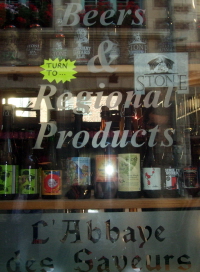
Shop window for local beer: Abbaye des Saveurs, Lille
Visit the huge Carrefour supermarket in the striking Euralille development around the international station to find better known regional brands like Jenlain, Ch’ti and Trois Monts at bargain prices. For the smaller brewers, though, you’re best advised to explore Vieux-Lille, the mediaeval core around the island created by the river Deûle that gives the city its name in both languages (‘l’île’, or in Middle Dutch, ‘ter ijssel’). Among the specialist shops in narrow and picturesque rue des Vieux Murs (‘old walls street’, recalling former fortifications), the Abbaye des Saveurs (‘abbey of flavours’) is unique in offering both local and global craft beers alongside specialist regional foods.
The smallish and charming shop is the sort of place a tourist may stumble upon while exploring the alluringly picturesque lanes of the old town, and at weekends in particular it’s well used by visitors from all over France, the UK, Belgium, the Netherlands and further afield loading up with authentic titbits.
But the dazzling range and the reasonable prices belie any suggestion of a tourist trap. Its founders – former engineer Franck Di Grégorio and his business partner Anthony D’Orazio, a chemist by training who once brewed at brewpub chain Les 3 Brasseurs – are genuinely and deeply passionate and knowledgeable about their wares.
“If you want to sell beer it’s important you know what it tastes like, the styles and the history,” Franck tells me. “When I began to drink beer at 18 I was first fascinated with sous bocks – beer mats – and wanted to know what the beers they advertised tasted like. So I read lots of books about beer and tasted as many beers as I could. I tried all the traditional Northern French beers then started travelling just to taste beer. I’ve been all over the world, and I have no prejudice about where beers should come from.”
Franck and Anthony noticed that despite the rich regional patrimoine brassicole, Lille’s single specialist beer store sold only Belgian beers. So when they opened the Abbaye in 2005, they were determined it should do justice to the local scene. That emphasis continues today, with the best part of the wall on the right given over to around 90 beers from 23 local breweries.
Besides a comprehensive range of familiar brands –Ch’ti, Choulette, Goudale, Trois Monts – there are lesser known bières de garde including the delightfully traditional Theillier Bavaisienne, Vieux Lille from Brasserie des Sources and beers from the Annoeullin, Bailleux and Saint-Germain breweries. Then there are the mould-breaking micros, from trailblazer Thiriez to the youthful likes of 2 Caps, Artésienne (Saint-Glinglin), Caou (Kaou’ët) and Pays Flamand.
Among these are the wonderfully distinctive house offerings from Craig Allan, an expatriate Scot and old friend of Anthony from his days as a student in Edinburgh. Though these are currently brewed over the border at Proef in West Flanders, the Abbaye team are working with Craig on opening their own brewhouse in nearby Cassel later in 2012.
Belgian beers have their place too, with a particularly well chosen selection. Lambics might include Cantillon’s dry hopped Cuvée Saint-Gilles, gueuze from new blender Tilquin and serious rarities from 3 Fonteinen (I spotted Armand 4 Saisons at €45). Trappists include the new beer brewed at Chimay for the Mont des Cats monastery, and first class brews from Abbaye des Rocs, Belgoo, Dochter van de Korenaar, Dupont, Ellezelloise, De Ranke, Sint-Bernardus, Saint-Feuillien and Struise are also on sale.
International choices, tellingly, mainly represent talked about new brewers with a global reputation rather than textbook classics. So there’s Thornbridge and BrewDog from the UK, US extreme beers from Stone, Danish gypsy brewer Mikkeller, Molen from the Netherlands, BFM from Switzerland, Dieu de Ciel from Québec and Toccalmatto from Italy. “We do get beer geeks,” concedes Franck, spontaneously using the English term. “Of course our customers travel and use the internet so some of them are familiar with these names.”
The food shelves, though, are unashamedly Flemish: pots of carbonnade flamande, several varieties of the mixed meat terrine known as potjesvlees, pâté with beer or genever, various waffles, cinnamon spekuloos biscuits and even spekuloos flavoured spread. Then there’s the local genièvre, beer eau-de-vie from a nearby distillery and a handful of whiskies including imported malts.
“There’s no point in trying to compete with supermarkets,” says Franck. “We can advise people about beer flavours and recommend beers they might like. The supermarkets can’t do that. So a customer might come in wanting one beer and end up buying 10 in different styles.” I imagine the infectious enthusiasm of the staff contributes as much to such happy outcomes as their knowledge and authority.
This enthusiasm has since spilled beyond the murs. In 2008, the duo opened a little pub, La Capsule, just around the corner at 25 rue des Trois Mollettes. With 10 draught beers and approaching 150 bottles, including cellar aged examples, it’s one of very few bars in the city to showcase regional brewers rather than big brands. It also offers monthly tastings and food pairing events.
Late in 2011, the business expanded again with a bigger venue called the Monk’s Café, a bar restaurant in the heart of the modern day city centre at 3 rue Nicolas Leblanc. A further opening is planned for 2012, with live music promised alongside more beer.
The expansion reflects how the growing craft beer movement is revitalising interest in beer even in the traditional brewing regions of Europe, coupling a concern for heritage and local production with a broad appreciation of flavour fuelled by international brewing culture. “We’ve been very successful,” concludes Franck, “because people want to drink beers with true taste, with bitterness or sourness, with full flavour and aroma.” Louis Pasteur would be delighted.
Researched November 2011.
Fact file
Address: 13 rue des Vieux Murs, 59000 Lille
Phone: +33 3 28 07 70 06
Web: www.abbayedessaveurs.com
facebook: Abbaye Des Saveurs
Hours: 1100 (1400 Tue)-1900 (1330 Sun, closed Mon)
Drink in? No, only in nearby pub
Mail order: Yes, via website
Manager’s favourites: 3 Fonteinen oude geuze, Proef/Craig Allan Cuvée d’Oscar, Saint-Glinglin and Kaou’ët beers
Beer picks
- Artésienne St Glinglin Édition Limitée Amarillo 6% Auchy-les Mines, Pas-de-Calais, France
- Pays Flamand Anosteké Brune Imperial Smout 8.5% Blaringhem, Nord, France
- Proef/Craig Allan Cuvée d’Oscar 7.5% Lochristi, Oost-Vlaanderen, Vlaanderen
- Theillier Bavaisienne Ambrée 6.5% Bavay, Nord, France
- Thiriez Blonde d’Esquelbecq 6.5% Esquelbecq, Nord, France


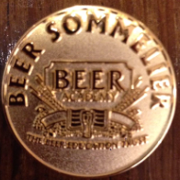
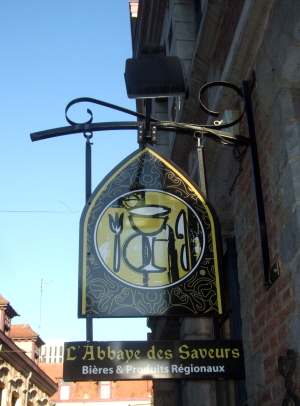

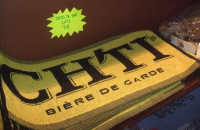
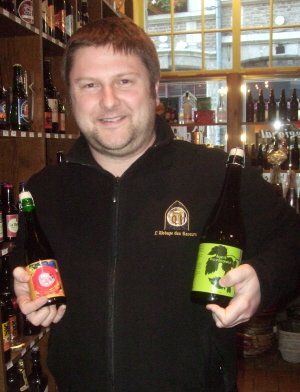
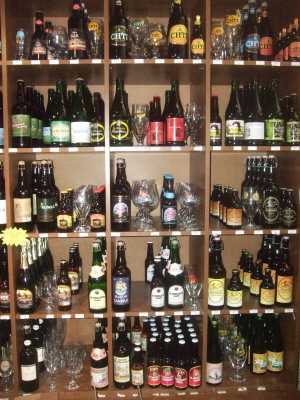
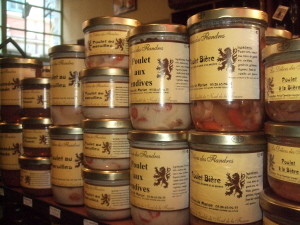
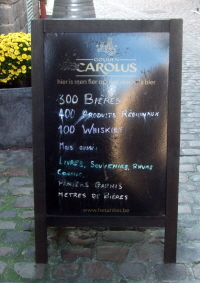
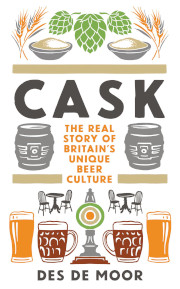
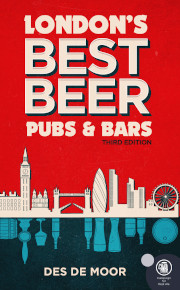
We were in Lille a few months ago and went to A les Chopes which is quite close to the market at Wazemmes. Possibly not quite as extensive a range as Abbaye des Saveurs but may be worth a visit.
I too found À les Chopes while exploring Wazemmes — I think that’s the shop that only did Belgian beers when Franck and Anthony were thinking about opening L’Abbaye des Saveurs, though it now does French beers too. However it certainly doesn’t have the range that the Abbaye does. There’s also a higher proportion of mainstream brands, and less from the smaller local breweries. Still worth a visit, but the Abbaye is a must see (and closer to the main line stations). Thankfully it’s practically doable in a morning from London!
FWIW, the revival of bière de garde is usually credited to the student community in Lille rather suddenly turning away from pale lager in favour of Jenlain (today’s Jenlain ambrée) during 1978. Which apparently took the brewery by surprise.
Will have to look out for some Eurostar deals and make another visit then, especially as it is so handy for the station.
I remember that I first came across biere de garde when Oddbins stocked some back in the mid 1908s which is when I first got into Jenlain (now ambree) and 3 Monts. Oddbins were a Godsend in those far off days with these beers and some of the early decent US brews…
I’ve heard that story too, Laurent, but it’s always struck me as one of those beer stories that’s rather too simplistic and unlikely to be entirely true. According to Raymond Duyck, as told to Gabriel Thierry in Sur la route des bières du Nord-Pas-de-Calais, the Duyck brewery launched Jenlain in 1968, based on an interwar recipe, in response to the evident popularity of Belgian beers like Chimay and Duvel in that part of France at the time. Clearly it was something they could do that the big lager brewers couldn’t. Jenlain was test marketed at a shop close to the Université Catholique de Lille which explains its association with students. The other well known brands from old established brewers seem to have emerged in the decades following — for example St Sylvestre revived warm fermentation with 3 Monts in 1984 because “the market was difficult” for the litre bottles of lager they’d been producing up to then.
Cool – always nice to find a little gem like this.
Off to Lille in the morning and glad to have come across this, thanks Des. It will be interesting to see how things have moved on in the intervening 18 months, actually nearer two years, since you researched this. Cheers.
I’d be interested too, must pop back to Lille sometime.
Thanks for this one, Des. I shall be visiting this shop tomorrow. Sounds like I’ll be taking the larger rucksack.